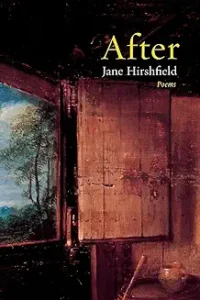After: Poems by Jane Hirshfield 2006
“After” is one of the three books of poems that I chose when invited by a Vermont friend to peruse her late husband’s library and take several volumes for myself. My friend and his widow had been MIT professors, and his library held a superb collection of books of poetry, philosophy, history, and anthropology. I chose three books by favorite poets, among them this one by Jane Hirshfield.
Hirshfield is a respected and much awarded poet who has published nine volumes of verse in addition to two non-fiction books about poetry. Unlike Ted Kooser’s close observation and spot-on descriptions of Midwestern small town life and different from William Stafford’s poetic protests against the treatment of Native Americans, our destruction of the environment, and the violence of war, Hirshfield’s poems explore the mysteries of language and perception and how the former might communicate the latter. Increasingly identified with addressing the climate crisis, she was quoted in her bio in the Poetry Foundation site as saying “Poetry, for me, is an instrument of investigation and a mode of perception, a way of knowing and feeling both self and world…I am interested in poems that find a clarity without simplicity; in a way of thinking and speaking that does not exclude complexity but also does not obscure; in poems that know the world in many ways at once—heart, mind, voice, and body.”
Her exploratory style is perhaps best demonstrated in the 18 poems among the several dozen in this collection which are labelled ‘Assay’. In these poems, she does a deep dive into a single word, e.g. envy, possibility, of, to, and and among others. The latter is ‘assayed’ as follows:
The strange wind pressed on everything at once—/A door blew open in one room, a vase fell in another./Is this not unlike the word ‘and’: omnipresent even unseen./Before disappears./After transforms into others./”And”–that strong rock–stays standing./Undevourable thus of connection./ Even death spits it back.
These are beautiful, mysterious, and deeply insightful poems, perhaps the best book of poetry I’ve read this year. Hirshfield’s background in Japanese Zen meditation and in science are evident, and the poems are primarily thought-provoking queries framed in special words. If you don’t know her work, this is an excellent book to start with.



